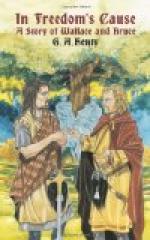The king and his companions welcomed Archie’s return warmly, although the report which he made showed that there was no hope of obtaining any serious diversion of the English attack by a permanent rising in Ireland; and the king, on hearing Archie’s account of all that had passed, assured him that he felt that, although he had failed, no one, under the circumstances, could have done otherwise.
Chapter XVII The King’s Blood Hound
The only other event which occurred throughout the winter was the arrival of a fishing boat with a messenger from one of the king’s adherents, and the news which he brought filled them with sorrow and dismay. Kildrummy had been threatened with a siege, and the queen, Bruce’s sisters Christine and Mary, his daughter Marjory, and the other ladies accompanying them, deemed it prudent to leave the castle and take refuge in the sanctuary of St. Duthoc, in Ross shire.
The sanctuary was violated by the Earl of Ross and his followers, and the ladies and their escort delivered up to Edward’s lieutenants and sent to England. The knights and squires who formed the escort were all executed, and the ladies committed to various places of confinement, where most of them remained in captivity of the strictest and most rigorous kind until after the battle of Bannockburn, eight years later. The Countess of Buchan, who had crowned Bruce at Scone, and who was one of the party captured at St. Duthoc, received even fouler treatment, by Edward’s especial orders, being placed in a cage on one of the turrets of Berwick Castle so constructed that she could be seen by all who passed; and in this cruel imprisonment she was kept like a wild beast for seven long years by a Christian king whom his admirers love to hold up as a model of chivalry.
Kildrummy had been besieged and taken by treachery. The king’s brother, Nigel Bruce, was carried to Berwick, and was there hanged and beheaded. Christopher Seaton and his brother Alexander, the Earl of Athole, Sir Simon Fraser, Sir Herbert de Moreham, Sir David Inchmartin, Sir John Somerville, Sir Walter Logan, and many other Scotchmen of noble degree, had also been captured and executed, their only offence being that they had fought for their country.
In all the annals of England there is no more disgraceful page than that which chronicles the savage ferocity with which King Edward behaved to the Scottish nobles and ladies who fell into his hands. The news of these murders excited the utmost fury as well as grief among the party at Rathlin, and only increased their determination to fight till the death against the power of England.




